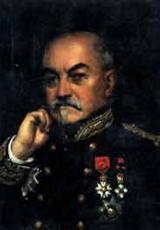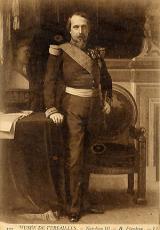François Bazaine
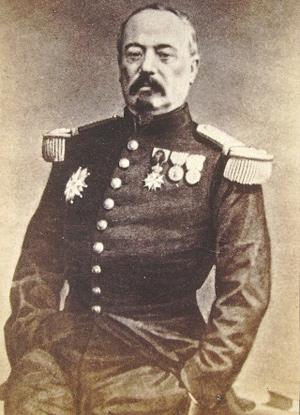
Source : Wikipedia, libre de droit
Marshal of France (Versailles, 13th February 1811 - Madrid, 23rd September 1888)
François Achille Bazaine was the son of Pierre Dominique and Marie Madeleine Josèphe, known as Mélanie Vasseur. He enlisted in the army in 1831, following his failure in the competition for entry to the Ecole Polytechnique. He served in the Foreign legion in Algeria and then, from 1835 to 1838, fought in Spain against the Carlists, before returning to Algeria where he was in charge of the district of Tlemcen. He became Colonel of the Legion in 1850. Bazaine distinguished himself during the Crimean War. His bravery earned him promotion to the rank of Division General. He commanded French troops during the Kinburln expedition in 1859, was wounded at Melgrano, and had a sizeable role in the Battle of Solferino, for which he would be promoted to the dignity of the Grand Cross of the Légion d'Honneur. A member of the contingent of legionnaires in Mexico from 1862 to 1867, he seized Puebla in 1863 and ended up replacing General Foyer at the head of the expeditionary corps. He forced the Mexican President, Benito Juárez, into exile. In recognition for his skills as commander, he rose to Marshal in 1864.
Widowed by the suicide of his wife, in 1865 he remarried a Mexican lady from a rich family close to the deposed president, who encouraged him to plot against Emperor Maximilian of Habsburg. Faced with American intervention, the French expeditionary corps was forced to withdraw; Bazaine would remain with his men until the evacuation to Vera Cruz was complete in 1867. Although on his return to France he was out of favour with Napoleon III, in 1869 his great popularity secured him the command of the Imperial Guard and in 1870 that of the third Army of the Rhine. The superiority in numbers of the German army, which was better equipped and trained, quickly overcame the Imperial Army. Following the defeat at Spicheren, Bazaine decided to maintain a strategic position. His colonial experience was, however, ineffectual. Indecisive and anxious, the Marshal let himself become surrounded in Metz (18th August) by Constantin von Alvensleben, who launched two corps of troops in an attack on the area, lasting two days. The requested reinforcements were slow to arrive. Torn between his duty to obey his hierarchy and constantly at variance with decisions linked to a power in which he no longer believed, and going along with the force that had come to "liberate France from herself", Bazaine decided to wait for Marshal Mac-Mahon's army from Châlons. Learning of the surrender of Napoleon III at Sedan (2nd September), he tried to act as mediator for France, wasting time in pursuit of this goal negotiating with Empress Eugénie, before finally being forced into an unconditional surrender on the 27th October 1870. The Germans took some 140,000 men prisoner from the Army of the Rhine.
In 1873, following the investigation of his case by Séré de Rivière, he was tried by a war council presided over by the Duke of Aumale, given a dishonourable discharge and sentenced to death. Pardoned by Mac-Mahon, who was then President of the Republic, he was sent to prison for twenty years on the island of Sainte-Marguerite, from where he escaped on the night of the 9th to 10th August 1874. He then went to Spain and settled in Madrid where he earned the respect of the government of Allfonse XII. He made the most of the last years of his life writing Épisodes de la guerre de 1870 et blocus de Metz (Events from the war of 1870 and the siege of Metz) (1883), a work justifying his standpoint.
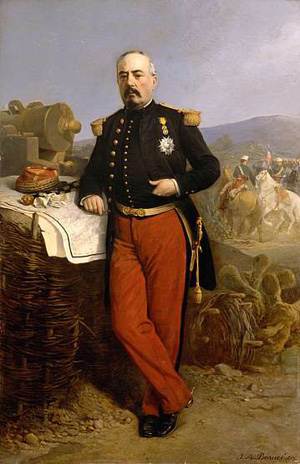
François Achille Bazaine. Campagne du Mexique. Tableau de Jean-Adolphe Beauce. Source : wikipedia, libre de droit
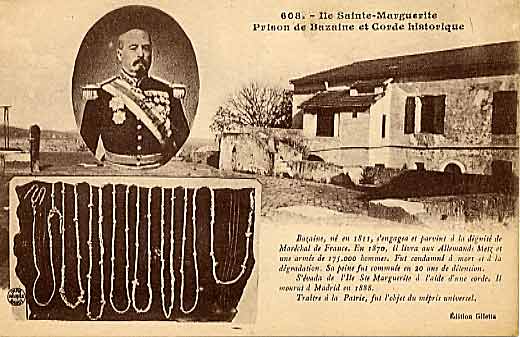
Prison de Bazaine. Source : SHD


